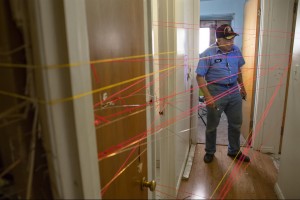
Directors Brad Barber and Scott Christopherson were awarded the Grand Jury Prize for best documentary feature film at the Paramount Theatre in Austin, Texas, on March 17. The awards ceremony was hosted by “Saturday Night Live” member Vanessa Bayer.
According to the SXSW website, “Peace Officer” was selected among 1,000 submissions and was up against nine other real-world stories.
The film embarks on the journey of a former police officer, William “Dub” Lawrence, who created the first SWAT team in Utah that ultimately took the life of his son-in-law, Brian Woods, years later. Throughout the course of the film, Lawrence shares his journey to find the clues to prove his son-in-law’s innocence and uncover what he believes is the truth behind the deadly the 12-hour standoff.
Barber, a BYU alumnus and professor in the film school, has always looked toward documentary film to show people a new and unique perspective.
“It lets us get into their shoes, see things from their perspective and learn about them in a way that’s difficult to do in any other art form,” Barber said.
Christopherson, the co-director on the film, is also a BYU alumnus and former graduate of the film program at BYU. He discovered the story for “Peace Officer” after Lawrence approached him to get help with editing compiled footage he obtained from GRAMA and the Freedom of Information Act.
Christopherson said being open to others’ differing ideas is important in being a successful documentary filmmaker.
“(It takes) being open to what’s going on around you,” Christopherson said. “I was open to Dub telling me about his story and saying, ‘Yeah, I’ll come to your office and check it (the footage) out.'”

Barber and Christopherson started the film only knowing about the increased police militarization in Utah, not aware how relevant a topic this would be years later.
“We started this two and a half years ago,” Barber said. “When we started making the film we couldn’t have anticipated that Ferguson would happen or that Eric Garner would happen and there would be such a national outcry about this issue.”




